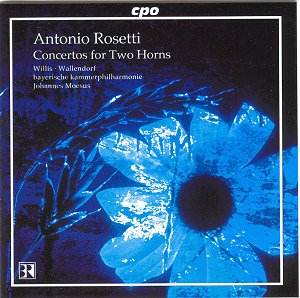This
well-filled disc is a delight from start to finish. Anybody who
has drooled over a performance of Mozart’s great horn concertos
is going to love the works of Rosetti. A somewhat obscure figure
of Bohemian origin, Rosetti Italianised his name and went to work
for the Prince Kraft Ernst of Oettingen-Wallerstein as a servant
and double bass player in 1773. By 1785 he was the conductor of
the court orchestra and had built it up to such a reputation that
it was mentioned in the same breath as the famous band from Mannheim.
In 1785 Rosetti took a similar post in another small German court,
that of the Duke Freidrich Franz 1 of Mecklenburg-Schwerin in
Ludwigslust. Unfortunately he died just three years later at the
age of 42. In these small principalities of 18th century
Germany, music was one of the most important symbols of prestige
and there was considerable competition to acquire the finest musicians
for the court orchestras. Haydn’s position with the Esterhazy’s
is the most famous example, but there were many such bands, many
of apparently outstanding quality.
In
the seven concertos for two horns that Rosetti composed he made
full use of the facilities at his disposal. In this case we (unusually)
can identify the actual horn players for whom the works were written;
Joseph Nagel (c.1752-1802) and Franz Zwierzina (1751-1825), both
Bohemians who joined the court orchestra of Oettingen-Wallerstein
around 1780 at impressively high rates of pay. The virtuosity
that Rosetti makes the horn players show is stunning. To think
that this was originally all done on valveless horns is almost
inconceivable.
While
the key of these works does not vary much (three in E flat and
one in E) the variety that Rosetti provides in timbre, texture
and harmony results in no sense of monotony, any more than it
does in Mozart’s horn concertos. The classical style just seems
to be so apt for the expressive melodic capabilities, and the
powerful, jaunty, huntsmen’s gallop of horns. The soloists in
this recording, both with years of orchestral experience behind
them, rise admirably to the challenges presented in these concertos.
The blend between the two horns is sonorous and the intonation
always immaculate. They are by turns, sombre, grand, bombastic
and then mellifluous, introverted and delicate, and the sheer
speed of some of the passagework is impressive, to make a significant
understatement.
Rosetti’s
orchestration is standard for the time, but exploits the richness
of timbre available from both oboes and orchestral horns to back
the soloists. The Bayerische Kammerphilharmonie plays with a verve
and sprightliness that matches the soloists. The winds are prominent,
but not obtrusive and the strings play with a consistently agile
sense of rhythmic flexibility and well-placed phrasing – so important
in the music of the late 18th century. It is so easy
for the slow movements of this type of repertoire to become nothing
more than a melody accompanied by a dirge. Johannes Moesus is
clearly well aware of this and keeps the orchestral balance and
texture forever changing and the blend of the string sections
is never anything less than perfect. It really is very good chamber
orchestra playing. There is a clear sense of zeal for this engaging
music – perhaps not surprising given that Moesus is president
of the International Rosetti Society (www.rosetti.de)
and artistic director of the Rosetti Festival Days, but he is
clearly onto a winner.
There
are informative booklet notes about Rosetti and his background,
good illustrations and well-designed, modern packaging. The engineers
of Bayerisches Rundfunk have done a superlative job in capturing
the vast range of pitch and volume of the solo horn parts and
the recorded sound is clean and bright, without being top heavy
or brittle. This is an undoubtedly joyous recording and is easily
recommendable. No listener could be disappointed with music as
engaging as this, performed as well as this is.
Peter
Wells
